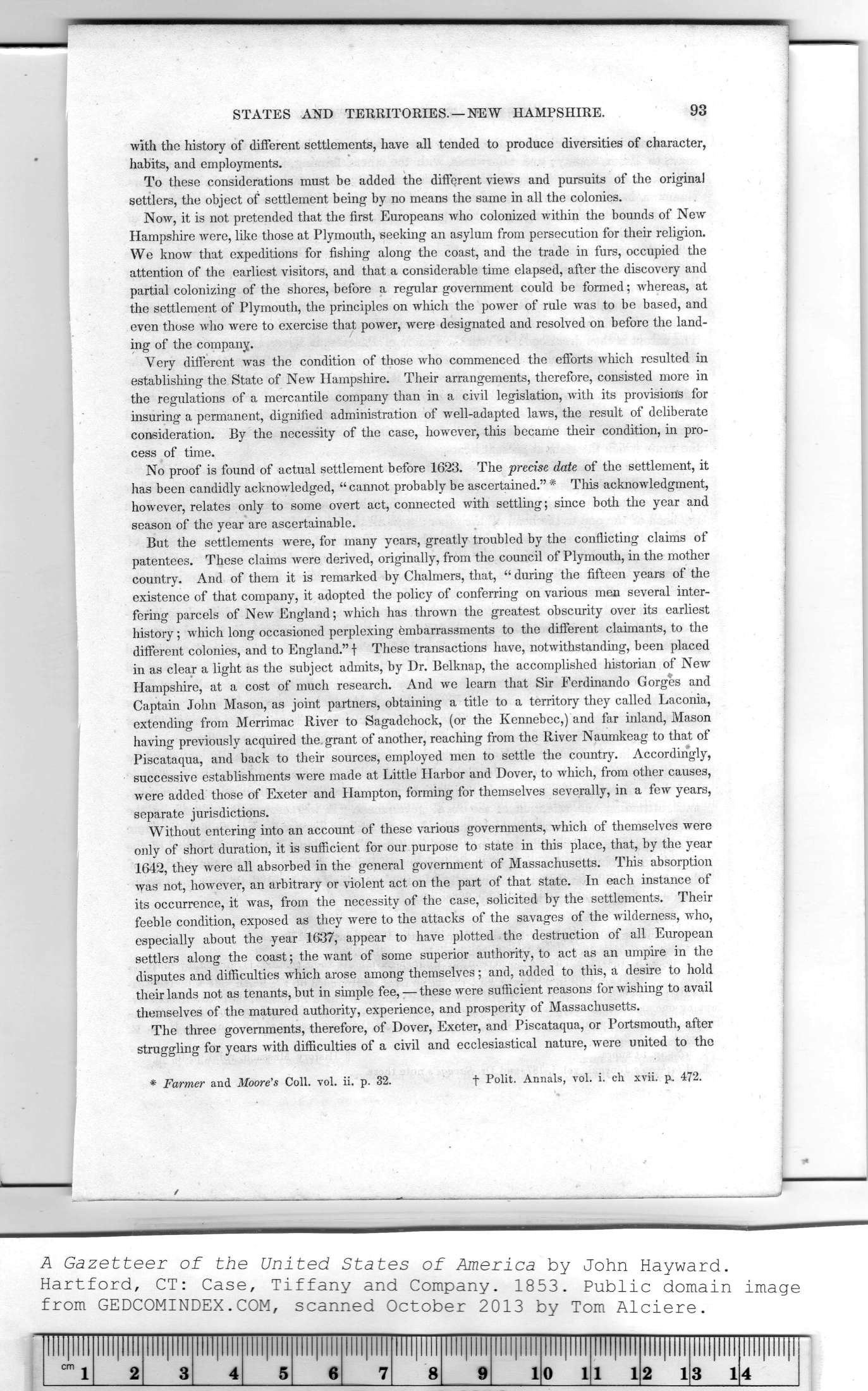|
|
Note: Ctrl and + increases the font size of the text below, Ctrl and - decreases it, and Ctrl and 0 resets it to default size.
STATES AND TERRITORIES. —NEW HAMPSHIRE. 93
with the history of different settlements, have all tended to produce diversities of character,
habits, and employments.
To these considerations must be added the different views and pursuits of the original
settlers, the object of settlement being by no means the same in all the colonies.
Now, it is not pretended that the first Europeans who colonized within the bounds of New
Hampshire were, like those at Plymouth, seeking an asylum from persecution for their religion.
We know that expeditions for fishing along the coast, and the trade in furs, occupied the
attention of the earliest visitors, and that a considerable time elapsed, after the discovery and
partial colonizing of the shores, before a regular government could be formed; whereas, at
the settlement of Plymouth, the principles on which the power of rule was to be based, and
even those who were to exercise that power, were designated and resolved on before the land-
ing of the company.
Very different was the condition of those who commenced the efforts which resulted in
establishing the State of New Hampshire. Their arrangements, therefore, consisted more in
the regulations of a mercantile company than in a civil legislation, with its provisions for
insuring a permanent, dignified administration of well-adapted laws, the result of deliberate
consideration. By the necessity of the case, however, this became their condition, in pro-
cess of time.
No proof is found of actual settlement before 1623. The precise date of the settlement, it
has been candidly acknowledged, “cannot probably be ascertained." * This acknowledgment,
however, relates only to some overt act, connected with settling; since both the year and
season of the year are ascertainable.
But the settlements were, for many years, greatly troubled by the conflicting claims of
patentees. These claims were derived, originally, from the council of Plymouth, in the mother
country. And of them it is remarked by Chalmers, that, “ during the fifteen years of the
existence of that company, it adopted the policy of conferring on various men several inter-
fering parcels of New England; which has thrown the greatest obscurity over its earliest
history; which long occasioned perplexing embarrassments to the different claimants, to the
different colonies, and to England." f These transactions have, notwithstanding, been placed
in as clear a light as the subject admits, by Dr. Belknap, the accomplished historian of New
Hampshire, at a cost of much research. And we learn that Sir Ferdinando Gorges and
Captain John Mason, as joint partners, obtaining a title to a territory they called Laconia,
extending from Merrimac River to Sagadehock, (or the Kennebec,) and far inland, Mason
having previously acquired the grant of another, reaching from the River Naumkeag to that of
Piscataqua, and back to their sources, employed men to settle the country. Accordingly,
successive establishments were made at Little Harbor and Dover, to which, from other causes,
were added those of Exeter and Hampton, forming for themselves severally, in a few years,
separate jurisdictions.
Without entering into an account of these various governments, which of themselves were
only of short duration, it is sufficient for our purpose to state in this place, that, by the year
1642, they were all absorbed in the general government of Massachusetts. This absorption
was not, however, an arbitrary or violent act on the part of that state. In each instance of
its occurrence, it was, from the necessity of the case, solicited by the settlements. Their
feeble condition, exposed as they were to the attacks of the savages of the wilderness, who,
especially about the year 1637, appear to have plotted the destruction of all European
settlers along the coast; the want of some superior authority, to act as an umpire in the
disputes and difficulties which arose among themselves; and, added to this, a desire to hold
their lands not as tenants, but in simple fee, — these were sufficient reasons for wishing to avail
themselves of the matured authority, experience, and prosperity of Massachusetts.
The three governments, therefore, of Dover, Exeter, and Piscataqua, or Portsmouth, after
struggling for years with difficulties of a civil and ecclesiastical nature, were united to the
* Farmer and Moore's Coll. vol. ii. p. 32. f Polit. Annals, vol. i. ch xvii. p. 472.
|
lllllllll |
lllllllll |
lllllllll |
lllllllll |
lllllllll |
lllllllll |
lllllllll |
lllllllll |
lllllllll |
lllllllll |
lllllllll |
lllllllll |
lllllllll |
lllllllll |
llll|llll|l |
|
cm j |
2 |
3 |
4 |
5 |
6 |
7 |
8 |
9 |
1 |
0 1 |
1 1 |
2 1 |
3 1 |
4 |
|
